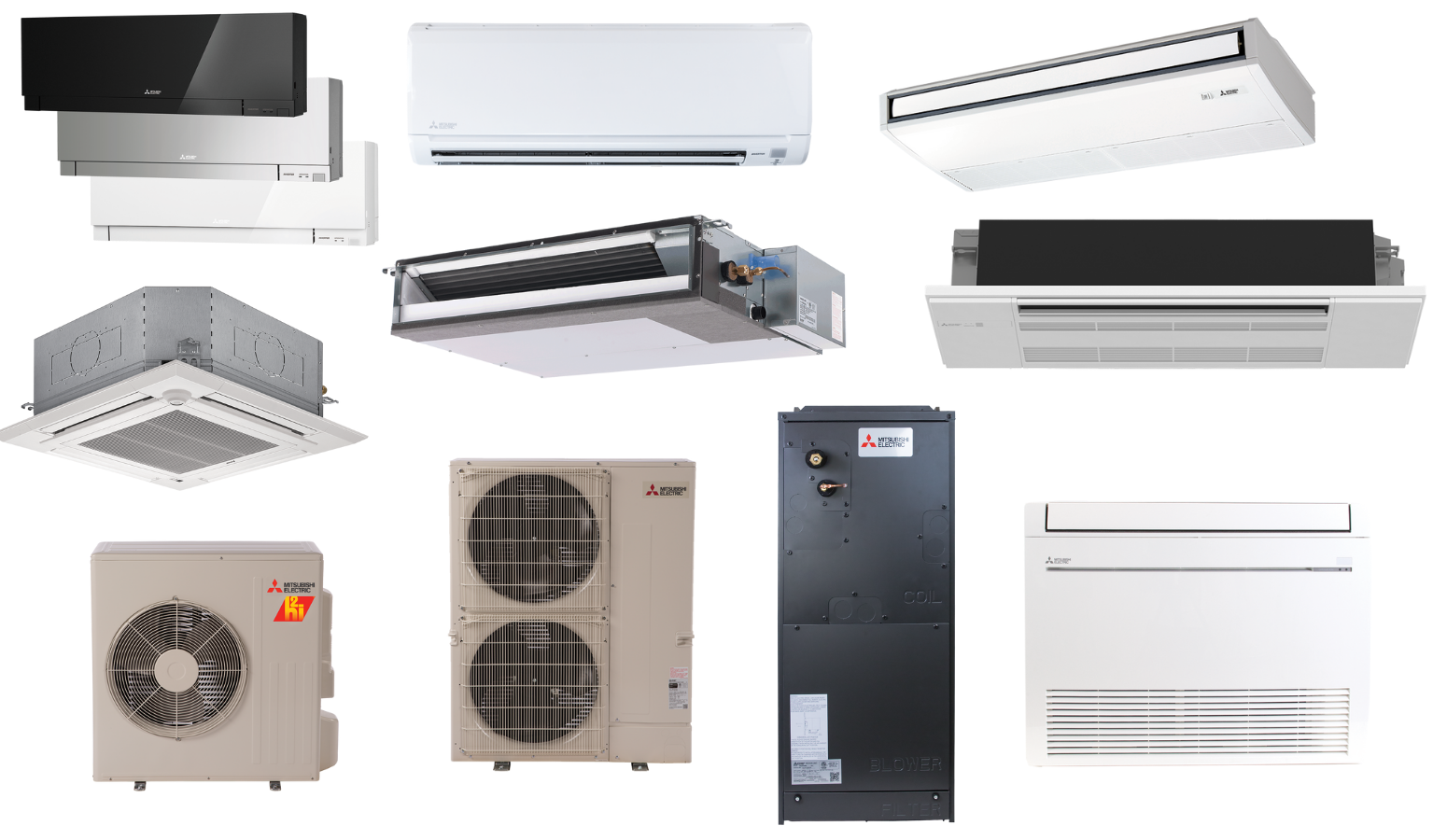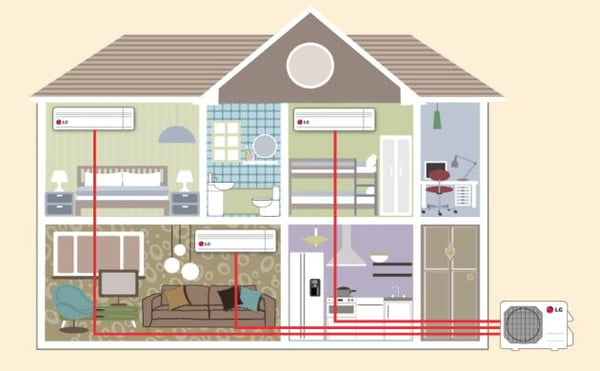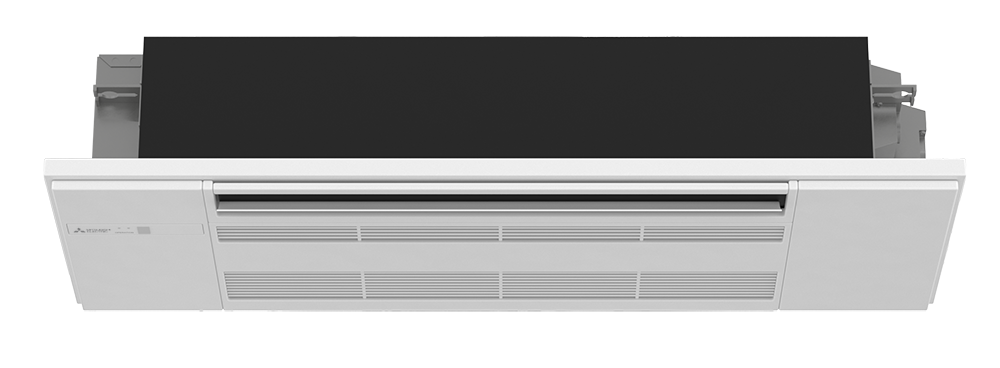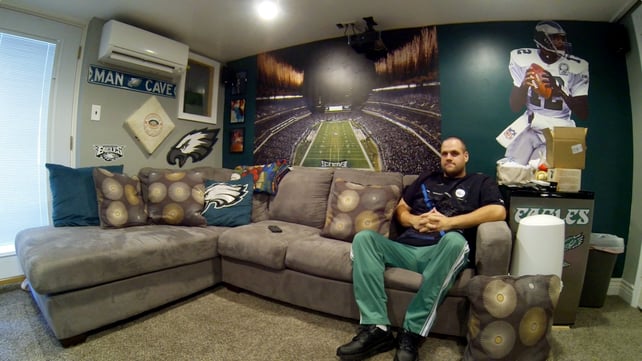In the market for a new or upgraded HVAC system? Do you have a tiny home, rowhome, or historic home? Are you looking to go all electric and save money? Want to supplement your current heating system? If you answered yes to any of these questions, we have one solution for you: a Mitsubishi Electric Heat Pump System.
Benefits of Mitsubishi Electric Systems
With so many options for home heating and cooling systems, it may be tough to decide what's best for your home and family's needs. But with all the benefits that come with a Mitsubishi Electric HVAC system, making a decision should be a little easier. A heat pump system from Mitsubishi is ideal for any type of home or application. The system is efficient, quiet, and saves you money on energy bills. It can be a ducted, ductless, or hybrid system and can function as your all-in-one heating and cooling system, too.

Mitsubishi Electric Heat Pumps Work for Any Application
It'd be easier to make a list of what this system doesn't work for because, well, there'd be nothing on it. But don't worry, we took the time to explain every application we could think of and how a Mitsubishi system would fit.
Whole home
A Mitsubishi heat pump system can be used to heat and cool your entire home without the need for large ductwork. Ducted indoor units are perfect for conditioning larger zones and can serve an entire floor like a conventional furnace or boiler can. The difference lies in the system's smaller ductwork and higher efficiency. With Mitsubishi Electric technology, units use the exact amount of energy needed to heat or cool an area, making the systems up to 40 percent more efficient than traditional alternatives. Ductless units can also be added for smaller comfort zones or rooms where there are different heating and cooling needs.

Your local Mitsubishi Diamond Contractor will help you figure out what kind of units are best for your home and how many you need to obtain optimal comfort. Each ducted or ductless indoor unit will serve as a designated zone where you have individual control over the temperature. Whether you opt for completely ducted system, ductless system, or a hybrid system, you will be looking at a more efficient, sustainable, and overall more comfortable way to heat and cool your home.
All-electric home
Looking to reduce your carbon footprint and move away from oil and gas? Heat pumps are the solution. Heat pumps move heat using refrigerant rather than create heat using fossil fuels. In heating mode, heat pumps transfer thermal energy from outside to inside, allowing the pump to provide more energy than it consumes. This means more energy is actually being used to heat your home instead of being wasted.
During warmer weather, the system transfers heat from inside the home to outdoors and conditions your home. Boilers and furnaces, on the other hand, produce carbon emissions and cannot provide cooling. Heat pumps are the only type of home heating system that serve as an all-in-one cooling system.
Another benefit of an all-electric home is more predictable energy bills. Due to greater precision and energy efficiency, an electric heat pump system gives you control over your bills and gets rid of separate gas metering. For new homes, going electric will also eliminate infrastructure costs for gas hookups.
Home without ductwork

You home may not have ductwork or may not be equipped for ductwork for many reasons. Whether it's an older or historic home, an addition, a rowhome, a tiny home, or you're just looking to boost efficiency, no ductwork is no problem.
Installing a ductless heat pump system limits disruption to your home's architecture and allows for preservation of historic property. Because ductless air handlers come in different forms and are customizable, you won't have to change the aesthetic of your home either. Zoning capabilities are also perfect for homes with interesting layouts, allowing for up to eight indoor units to be connected to one outdoor unit.
Quieter system
You may have gotten used to the loud rumble of your HVAC system kicking on, and you probably enjoy the moments of quiet whenever it clicks off. But what if you could have an efficient system that comfortably conditions your home without that annoying noise?
Mitsubishi mini-split systems are "whisper-quiet", operating at a sound level equivalent to a human whisper. With a Mitsubishi heat pump system, you can concentrate in your home office, sleep soundly in your bedroom, and peacefully watch TV or read a book in the living room. Backyard parties and basking in the sun no longer has to be accompanied by the sound of a loud outdoor unit.
Not only are these systems quiet and efficient, but the design of Mitsubishi Electric units also makes filter changes and access to servicing a breeze. According to their website, "improper maintenance is often the cause of clicking, clanging or buzzing noises from your heating and air-conditioning systems." All units come with washable, long-lasting filters, making daily keep-up much easier and lessening the chance that your unit will make unwanted sounds.
Boiler-heated home
Heat pumps are great for providing air conditioning and supplemental heat in homes using boiler systems. Boilers cannot produce more heat than they consume as energy, while heat pumps can provide up to three times more energy as heat than they use as electricity. Heat pumps can be used to condition your home in the summer and then provide supplemental heat in the spring and fall. Then your boiler can be used during the winter months. This increases your energy efficiency, reduces your heating costs, and lessens the strain on both systems.
Alternatively, you can go with a Mitsubishi Hyper-Heat heat pump for your one heating and cooling system. Using H2i® technology, these systems can provide efficient heat when it's below freezing outside. With Hyper-Heat, you will get 100 percent of the system's capacity even as low as five degrees outside, compared to standard heat pumps that start losing efficiency at around 25 degrees.
Oil, propane, or gas-heated home
According to the Environmental Protection Agency, 13 percent of total greenhouse gas emissions in the U.S. come from fossil fuels burned to heat residential and commercial buildings. Not to mention, without proper venting, conventional heaters can increase air pollution and expose homeowners to unhealthy fumes and odors.
An electric mini-split system will reduce your reliance on fossil fuels, reduce your risk of pollution, and make you less susceptible to shortages and unreliable price fluctuations. In regions like the Northeast, especially, homeowners may be looking to switch to electric after the recent unpredictable shortages and pricing.
Based on your climate zone, the efficiency of your existing fuel-burning system, the efficiency rating of the specific heat pump, and other factors, the reduction of carbon footprint from a heat pump will vary.
Not only will using a heat pump as a supplemental or full heating source lower energy usage and bills, but you will also have a more efficient cooling system. In cooling mode, Mitsubishi heat pumps are up to 40 percent more efficient than conventional air-conditioning systems, so you're saving money all year long.
Tiny home
/cdn.vox-cdn.com/uploads/chorus_image/image/65893255/small_storage_xl.0.jpg)
If you're a part of the Tiny House Movement, you'll need a comfortable and efficient way to condition your home. Living in a “tiny house” provides many advantages including a smaller footprint and cheaper finances, to name a few. So why would you want to offset these benefits with an energy-and-money-hungry system?
Keeping your footprint and energy bills low while maintaining healthy air circulation is important for these tiny homes. That's where ductless mini-split systems come in. Without the need for intrusive installation, ductless heat pumps are perfect for heating and cooling your tiny home without taking up valuable space. You also won't need to worry about ruining the charm, as ductless allows you to choose between wall-mounted, floor-mounted, and ceiling cassette styles.
Above-garage rooms
One of the biggest issues with a room above a garage is the tendency to get hot and cold spots. Because garages typically aren't insulated, drafts of air end up in the space above it. According to Mitsubishi's website, above-garage rooms also tend to be at the opposite end of the house from existing HVAC equipment, making it hard to tie in a new unit for a conventional system.
With a ductless or ducted unit, you can make this room more comfortable without a lot of added construction. Does the room function as a bedroom and get too cold at night? With zoned heating and cooling, you can warm the room separately and eliminate cold drafts. Is your above-garage room an office that's too warm in the day? Set the unit cooler in that room, then simply turn it off when it isn't in use.
Basement
Finishing or remodeling your basement is a wonderful way to increase usable space in the home that's also more private than the rest of the home. However, that means you'll have another area to cool and heat, and your existing system likely wasn't sized to include the basement. Replacing the entire system or adding additional ductwork would be costly, time-consuming, and would require significant construction. Plus, ductwork installation means reduced ceiling heights for drop-ceilings or soffits.
Alternatively, you can install a mini-split system to reduce installation time, intrusiveness, and costs. Whether your basement is a man cave, family movie room, or exercise studio, a ductless or ducted heat pump system will provide you all the benefits you need without the drawbacks.
Bedroom that's too hot or cold
According to a Healthline article, studies have shown that the temperature of the room you sleep in is one of the most important factors in getting quality sleep. While doctors say a cooler temperature is more ideal, the temperature in your bedroom should be whatever you think is most comfortable. In a 2019 American Home Comfort Study, 49 percent of centralized system owners reported having at least one room that's too warm in the summer and 52 percent have at least one room that's too cold in the winter, according to Mitsubishi's website.
No matter what the specific issue is, a heat pump system can fix your uncomfortable bedroom. With mini-split zoning, indoor units are placed directly in the room to ensure maximum comfort and individualized control. You'll no longer have to argue with family members over setting the main thermostat higher or lower -- it's the temperature you like, whenever you want.
You also don't have to worry about taking up space or messing with the room's aesthetic. Many homeowners who use a mini-split for a bedroom go with the EZ FIT® ceiling cassette -- a slim design that fits into shallow ceiling cavities.

Home additions
Expanding your home does not mean you need to expand your existing HVAC system or spend money on new ductwork. Your addition may be constructed differently or may be used far more or less than the rest of the home. Maybe extending your system would work just fine, but you want to keep disruption to a minimum and spend less on construction. No matter the situation, adding a mini-split system will ensure maximum comfort in the new space(s). For multi-room additions, you can combine ductless and ducted units and repurpose old ducts. There are many options and combinations that allow you to set each zone to whatever makes the most sense for your comfort needs.
More efficient system
Heat pumps are more efficient than traditional systems in many ways. The first is that a conventional system uses long runs of ductwork that extend to each room. With air having to travel a long distance to each end of the home, there is almost always leakage out the ducts. In a typical house, about 20 to 30 percent of the air that moves through the duct system is lost due to leaks, holes, and poorly connected ducts. This results in higher utility bills and lower overall comfort. With mini-splits, air handlers are placed throughout the home, meaning each zone will receive comfortable airflow in a more efficient manner.
There is also the fact that traditional outdoor compressors are constantly starting and stopping, creating huge energy spikes for your system. Heat pump compressors, on the other hand, run continuously and only use the precise amount of energy needed along with specific fan speed to meet the set temperature. Using INVERTER® driven compressors, heat pumps allow for up to 40 percent more efficiency than traditional systems.
The third major difference in efficiency is the that mini-split systems allow for zoning. Indoor units can be set back or turned off completely on an as-needed basis. Let's say only one bedroom upstairs is being used over the weekend while everyone else is away. Conditioning the entire upstairs is a waste of energy and money! With zoned control, you can condition just the room in use and turn off the air handlers in the others.
And much more
No matter the application, a Mitsubishi heat pump system is the right solution to your home comfort needs. Whether you need to heat or cool your whole home (old or new), a she-shed, a sunroom, a man cave, a garage, or an exercise room, both ducted and ductless options are available to suit your needs.
If you live in the Delaware Valley/Greater Philadelphia area and would like to find comfort within your home, visit our website or give us a call at 215 - 245 - 3200.








